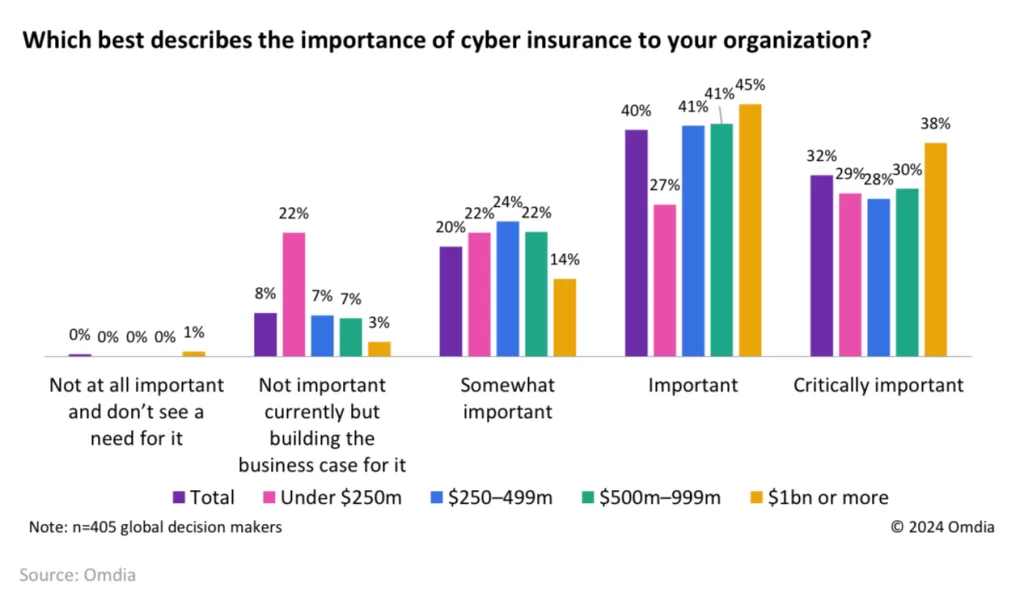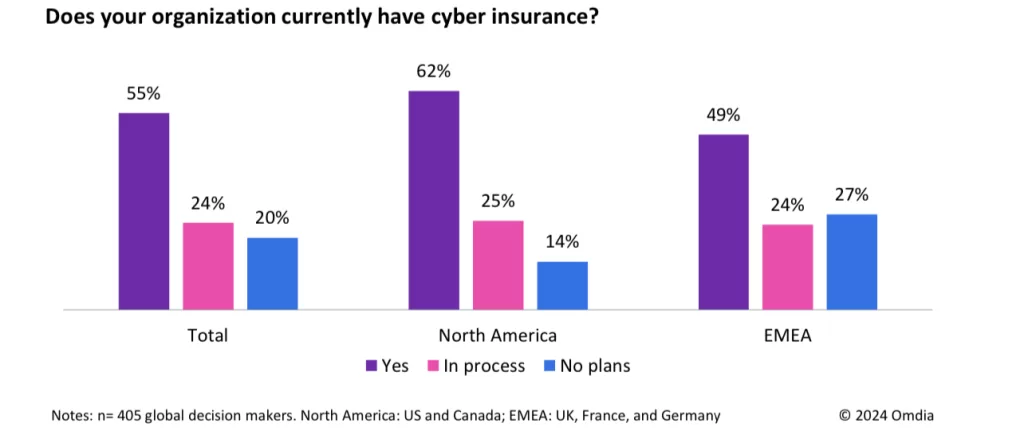Cybersecurity incidents have become a major financial burden for businesses worldwide, with losses reaching billions annually. In 2023 alone, the global economy lost an estimated $10.5 trillion due to cybercrime, a stark reminder of the increasing cyber threat landscape. As these threats continue to evolve, a new study by Omdia, in collaboration with At-Bay, highlights the growing importance of cyber insurance in shaping proactive cybersecurity strategies. The study reveals that businesses increasingly view cyber insurance as a safety net and a critical driver for cybersecurity investments. However, the report also uncovers significant opportunities for companies, especially those in critical infrastructure sectors, to collaborate more closely with their insurance providers to enhance their security.
What follows is our takeaway; you can get the full report here.

The Rise of Proactive Security
The cybersecurity landscape is significantly shifting as businesses across all sectors prioritize proactive security measures. According to the Omdia report, more than 70% of security leaders have increased their spending on proactive security solutions over the past year, a trend that surpasses investments in traditional preventive and reactive approaches. Proactive security involves identifying and mitigating threats before they can exploit vulnerabilities, offering a more comprehensive defense mechanism.
Andrew Braunberg, an tanalyst at Omdia, emphasized the evolving approach: “We are witnessing a new era where proactive security solutions are becoming a best practice among organizations. These solutions enable enterprises to consistently address unknown threats, manage attack surfaces more effectively, and optimize security controls.”
Despite this positive trend, many organizations still face challenges in fully integrating proactive security into their broader risk management strategies. Notably, the study found that only 29% of respondents currently adopt a strategic approach to proactive security, while 35% describe their approach as semi-strategic. Larger organizations with mature security practices are leading the way, but there is still a significant gap between awareness and action, particularly among smaller companies.
The Role of Cyber Insurance in Security Spending
Cyber insurance is rapidly emerging as a critical component of organizational cybersecurity strategies. The study found that 72% of security leaders consider cyber insurance “critical” or “important” to their organization. This recognition is driving significant changes in how companies allocate their cybersecurity budgets. For 43% of respondents, cyber insurance requirements are a major or leading factor in determining cybersecurity expenditures, rising to 52% among the largest organizations.

Thom Dekens, Chief Business Officer at At-Bay, highlighted the growing influence of cyber insurance: “Cyber insurance has become a critical pillar in building a proactive cybersecurity strategy. It enables companies to complete their risk mitigation efforts, and when paired with an InsurSec provider, it offers the potential to not only meet compliance requirements but also to strategically reduce risk and enhance technology performance.”
The study underscores the potential for cyber insurance to act as both a carrot and a stick in guiding security investments. InsurSec providers, which combine cybersecurity products with insurance offerings, are well-positioned to offer data-driven insights that can help businesses optimize their security controls. By leveraging their access to post-incident claims data, these providers can offer timely advice on the most effective security measures, making them valuable partners in a proactive security strategy.

Missed Opportunities in Critical Infrastructure
Despite the clear benefits of integrating cyber insurance into proactive security strategies, the report reveals a concerning lag in adoption among critical infrastructure sectors. While 13% of respondents overall work proactively with their cyber insurance providers to reduce risk, this figure drops significantly in sectors such as manufacturing (4%), energy, utility, and transportation (7%), and healthcare (8%).
This disparity suggests a missed opportunity for businesses in these sectors to enhance their security posture by partnering more closely with insurers. The report indicates that many companies still view cyber insurance primarily as a compliance requirement or a reactive measure rather than a strategic tool for proactive risk management.
Braunberg pointed out the potential for improvement: “There’s a large number of organizations that should consider partnering with a cyber insurance provider to help drive cybersecurity maturity. This partnership can be particularly valuable in critical infrastructure sectors, where the societal impact of cyber risk is significant.”
The Path Forward: Strategic Partnerships and Integrated Solutions
The At-Bay/Omdia report concludes that businesses of all sizes benefit from a more integrated approach to cybersecurity, where proactive security solutions are closely aligned with cyber insurance requirements. For smaller and less mature organizations, the report suggests that partnering with an InsurSec provider could provide much-needed guidance on effectively investing in proactive security solutions.
As the cybersecurity landscape continues evolving, the convergence of proactive security and cyber insurance will likely become a standard practice. This integration enhances an organization’s ability to manage risk and ensures that investments in cybersecurity are aligned with the broader goal of business resilience.
The study illuminates the critical role of cyber insurance in driving proactive security strategies and highlights the opportunities for businesses to partner more effectively with InsurSec providers. As companies navigate the complexities of cybersecurity, those who embrace this strategic synergy will be better positioned to protect their assets and ensure long-term success in an increasingly digital world.
Source: InsurSec Can Drive An Effective Proactive Cybersecurity Strategy Says New Analyst Report.
Other News: CFC Levels Up Proactive Cyber Game with Cybersecurity Veteran Jason Hart(Opens in a new browser tab)
Other News: US intelligence officials say Iran is to blame for hacks targeting Trump, Biden-Harris campaigns.
